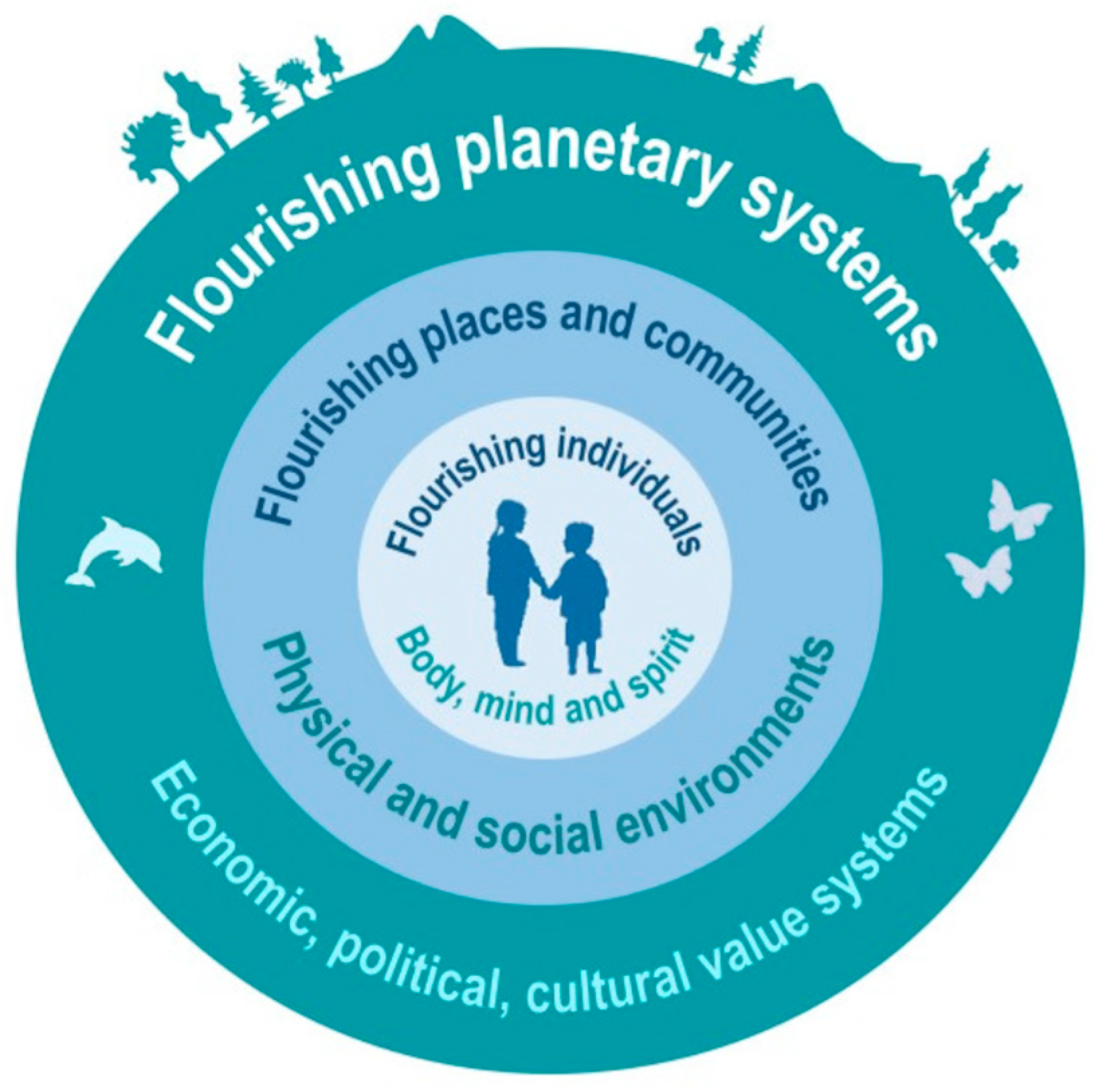A New Vision for Challenges: A Transdisciplinary Journal Promoting Planetary Health and Flourishing for All
1. Introduction—Challenges’ Strong Foundations in Planetary Health
2. Providing an Integrated Vision That Promotes Concepts of Planetary Health
3. The New Description and Aims of Challenges
4. The New Scope of Challenges
- (1)
- Human Flourishing (health and wellbeing)—including the interplay between human beings and their physical, emotional, social, economic, and political environments.
- (2)
- Climate Change and Earth’s Biophysical Systems (human interdependence and impact on large scale “planetary boundaries”).
- (3)
- Biodiversity and Natural Ecology (including microbial systems).
- (4)
- Food Systems.
- (5)
- Regenerative Economies (including regenerative business and wellbeing economies).
- (6)
- Indigenous and Traditional Ecological Knowledge.
- (7)
- Sustainable Energies (with an emphasis on risks and benefits to human and planetary systems).
- (8)
- Social Trends and Transitions (including psychology, attitudes, behaviors and movement building).
- (9)
- Technologies (solutions and risks to planetary health).
- (10)
- Ethics, Values, and Spirituality (worldviews and mindsets that influence planetary health and justice).
- (11)
- Planetary Health Education (including knowledge, skills, emotional intelligence, and moral wisdom).
- (12)
- Governance, Development, Policy, Peace, and Justice (including infrastructure, planning, law, for more livable, fair, and sustainable systems).
5. Conclusions
Author Contributions
Data Availability Statement
Conflicts of Interest
References
- Whitmee, S.; Haines, A.; Beyrer, C.; Boltz, F.; Capon, A.G.; de Souza Dias, B.F.; Ezeh, A.; Frumkin, H.; Gong, P.; Head, P.; et al. Safeguarding human health in the Anthropocene epoch: Report of The Rockefeller Foundation-Lancet Commission on planetary health. Lancet 2015, 386, 1973–2028. [Google Scholar] [CrossRef] [PubMed]
- Prescott, S.L.; Logan, A.C.; Albrecht, G.; Campbell, D.E.; Crane, J.; Cunsolo, A.; Holloway, J.W.; Kozyrskyj, A.; Lowry, C.A.; Penders, J.; et al. The Canmore Declaration: Statement of Principles for Planetary Health. Challenges 2018, 9, 31. [Google Scholar] [CrossRef]
- Myers, S.S. Planetary health: Protecting human health on a rapidly changing planet. Lancet 2017, 390, 2860–2868. [Google Scholar] [CrossRef] [PubMed]
- Planetary Health Alliance: What is Planetytary Health? Available online: https://www.planetaryhealthalliance.org/planetary-health (accessed on 5 May 2024).
- United Nations. Transforming Our world: The 2030 Agenda for Sustainable Development. United Nations General Assembly, Seventieth Session Agenda Items 15 and 116. Available online: https://sdgs.un.org/2030agenda (accessed on 5 May 2024).
- Prescott, S.L.; Logan, A.C.; Bristow, J.; Rozzi, R.; Moodie, R.; Redvers, N.; Haahtela, T.; Warber, S.; Poland, B.; Hancock, T.; et al. Exiting the Anthropocene: Achieving personal and planetary health in the 21st century. Allergy 2022, 77, 3498–3512. [Google Scholar] [CrossRef] [PubMed]
- World Health Organization. Valuing Health for All: Rethinking and building a whole-of-society approach. In The WHO Council on the Economics of Health for All—Council Brief No. 3; World Health Organization: Geneva, Switzerland, 2022. [Google Scholar]
- Horton, R.; Beaglehole, R.; Bonita, R.; Raeburn, J.; McKee, M.; Wall, S. From public to planetary health: A manifesto. Lancet 2014, 383, 847. [Google Scholar] [CrossRef] [PubMed]
- Prescott, S.L.; Logan, A.C. Transforming Life: A Broad View of the Developmental Origins of Health and Disease Concept from an Ecological Justice Perspective. Int. J. Environ. Res. Public Health 2016, 13, 1075. [Google Scholar] [CrossRef] [PubMed]
- James Gustave Speth Shared Planet: Religion and Nature, BBC Radio Interview. Available online: https://www.bbc.co.uk/sounds/play/b03bqws7 (accessed on 3 March 2023).
- About Challenges: Aims, Scope and Information. Available online: https://www.mdpi.com/journal/challenges/about (accessed on 5 May 2024).
- Logan, A.C.; Nadkarni, N.M. Tapestry Thinking: An Interview with Dr. Nalini Nadkarni on an Unexpected Life in Science. Challenges 2022, 13, 61. [Google Scholar] [CrossRef]
- Prescott, S.L. Planetary Health Requires Tapestry Thinking—Overcoming Silo Mentality. Challenges 2023, 14, 10. [Google Scholar] [CrossRef]
- Logan, A.C.; Berman, B.M.; Prescott, S.L. Earth Dreams: Reimagining ARPA for Health of People, Places and Planet. Int. J. Environ. Res. Public Health 2021, 18, 12788. [Google Scholar] [CrossRef] [PubMed]
Short Biography of Authors
 | Prof. Susan L. Prescott MD, PhD, is a pediatrician, immunologist, artist, and award-winning author, internationally recognised for her cutting-edge research into the early environmental determinants of health and disease. Her work promotes awareness of the interconnections between personal and planetary health in ways that inspire creative, integrated, and wise approaches, grounded in reciprocity, for social and ecological justice and flourishing futures. Susan is Professor of Planetary Health at University of Western Australia in Perth where she is founding Director of The ORIGINS project, an intervention birth cohort of 10,000 families aimed at improving all aspects of long-term physical and emotional health. She is also an Adjunct Professor in Family and Community Medicine, University of Maryland, Baltimore. She is Editor-in-Chief of Challenges journal which promotes interdisciplinary discourse in planetary health, and founding Director of the Nova Network (formerly inVIVO Planetary Health), a global trans-transdisciplinary network focused on transforming health of people, places, and planet, based at the Nova Institute for Health in Baltimore, and She is a Fellow of the Royal Australasian College of Physicians and the Australian Academy of Health and Medical Sciences. She has been awarded more than $52 million in research grants as chief investigator and received numerous awards. Previously, she was a Director of the World Allergy Organization (2012–2016) and the founding President of the DOHaD Society (Developmental Origins of Health and Disease) of Australia and New Zealand (2014–2018). In addition to over 400 scientific publications, Susan is author of several books for the public. |
 | David Webb MBA, PhD, is an Associate Professor at the University of Western Australia Business School. In addition to being a regenerative solutions, planetary health and business ethics educator, he is a researcher, author, presenter and personal coach. With a focus on motivational psychology, and often through a self-determination theory lens, his research explores both pro-social and pro-environmental behavior challenges across a range of contexts, including the interface between marketing systems and quality of life, and the psychology of consumption. Among other awards, David was awarded Distinguished Research Fellow of the International Society for Quality of Life Studies (ISQOLS) in 2010 for substantial research contributing to a better understanding of Quality of Life issues. He has held numerous international academic and industry positions in Germany, the Far East, the United States, and the United Kingdom, together with an executive position at a management consultancy firm in South Africa. He is Associate Editor of the Journal of Macromarketing, Associate Editor of Challenges and a member of the Planetary Health Alliance. |

Disclaimer/Publisher’s Note: The statements, opinions and data contained in all publications are solely those of the individual author(s) and contributor(s) and not of MDPI and/or the editor(s). MDPI and/or the editor(s) disclaim responsibility for any injury to people or property resulting from any ideas, methods, instructions or products referred to in the content. |
© 2024 by the authors. Licensee MDPI, Basel, Switzerland. This article is an open access article distributed under the terms and conditions of the Creative Commons Attribution (CC BY) license (https://creativecommons.org/licenses/by/4.0/).
Share and Cite
Prescott, S.L.; Webb, D. A New Vision for Challenges: A Transdisciplinary Journal Promoting Planetary Health and Flourishing for All. Challenges 2024, 15, 26. https://doi.org/10.3390/challe15020026
Prescott SL, Webb D. A New Vision for Challenges: A Transdisciplinary Journal Promoting Planetary Health and Flourishing for All. Challenges. 2024; 15(2):26. https://doi.org/10.3390/challe15020026
Chicago/Turabian StylePrescott, Susan L., and David Webb. 2024. "A New Vision for Challenges: A Transdisciplinary Journal Promoting Planetary Health and Flourishing for All" Challenges 15, no. 2: 26. https://doi.org/10.3390/challe15020026
APA StylePrescott, S. L., & Webb, D. (2024). A New Vision for Challenges: A Transdisciplinary Journal Promoting Planetary Health and Flourishing for All. Challenges, 15(2), 26. https://doi.org/10.3390/challe15020026





